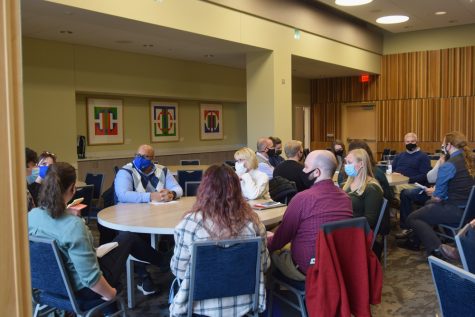Student Senate continues data collection, education on OER
Nov 1, 2021

With International Open Access Week spurring new efforts from Grand Valley State University student government, lower textbook costs may be coming to the university.
Working with University Libraries representatives, the Educational Affairs Committee of GVSU’s Student Senate has already begun work on data collection and education efforts surrounding open educational resources (OER) in hopes of working with the university to drive down textbook costs. This week, the committee took their outreach efforts one step further, offering a workshop for the full Student Senate to connect to the needs of their constituents and contemplate how more access to OER could resonate with and satisfy the needs of students.
“As student senators, you have the ability to sit on most of the committees if not all of the committees that make things happen at the university and almost all of those committees have some way that you could bring up the conversation around OER in them,” said GVSU’s Scholarly Communications Outreach Coordinator Matt Ruen.
Coordinating with Ruen, Senator Chrystina Ochsankehl led the workshop to prompt constituent-oriented discussion and talk more about the benefits of OER outside its reduction of student textbook costs.
“I don’t know about you, but sometimes when I’m looking for books for my classes, I wait for weeks to get them because they’re not in stock,” Ochsankehl said. “Comparatively, for OER, you get access to your textbooks immediately.”
Nevertheless, textbook costs and complications represent an inescapable reality for many – one no less evident when the Senate was convened. When Ruen asked how many senators had gone without purchasing textbooks due to their cost, hands went up across the room. When asked how they would otherwise spend the cost of textbooks for their classes, senators mentioned paying for rent, clothes, and tuition among other necessities.
“If I had more affordable textbooks, that’s up to, like, $500 more that I have to pay rent, put gas in my car, (and) buy groceries,” said Student Senate Vice President for Educational Affairs Faith Kidd. “So, making textbooks more affordable for me means that I can spend more time doing Student Senate rather than working, where I can spend more time on my studies rather than working because that’s less money I have to take out of my bank account.”
Kidd said he has also seen the impact a decrease in textbook costs could have for others throughout the student body as well.
“For a lot of people that are close to me, they’re kind of in a similar situation,” Kidd said. “Tuition’s expensive, books are expensive, apartments are expensive, life’s really expensive.”
Kidd said that many students are forced to make a decision between textbooks and other resources, and essential needs like meal plans.
“They’re put in situations a lot of times where they have to make a choice like, ‘Okay, am I going to buy myself a meal plan or am I going to buy myself books,’ and I don’t believe you should ever be in that situation as a student,” Kidd said.
Ruen and Ochsankehl made certain that the impact Kidd and others would feel would be worth much more than any cost incurred to the university and the surrounding community.
“We invest ‘x’ amount and it’ll save students in our state five (times) or 10 (times that amount),” Ruen said.
Hoping to inspire a call to action from the Senate, Ruen said the senators hold a lot of power and influence regarding OER expansion and improving the lives of their constituents.
“If OER were coming up in every single committee, the university would take notice,” Ruen said.
Looking forward, Kidd said she hopes that her committee’s work on educating members will soon inspire action from the full Senate to not only challenge educators to become more involved in OER but also support her committee’s upcoming legislation to decrease costs and increase opportunity.
























